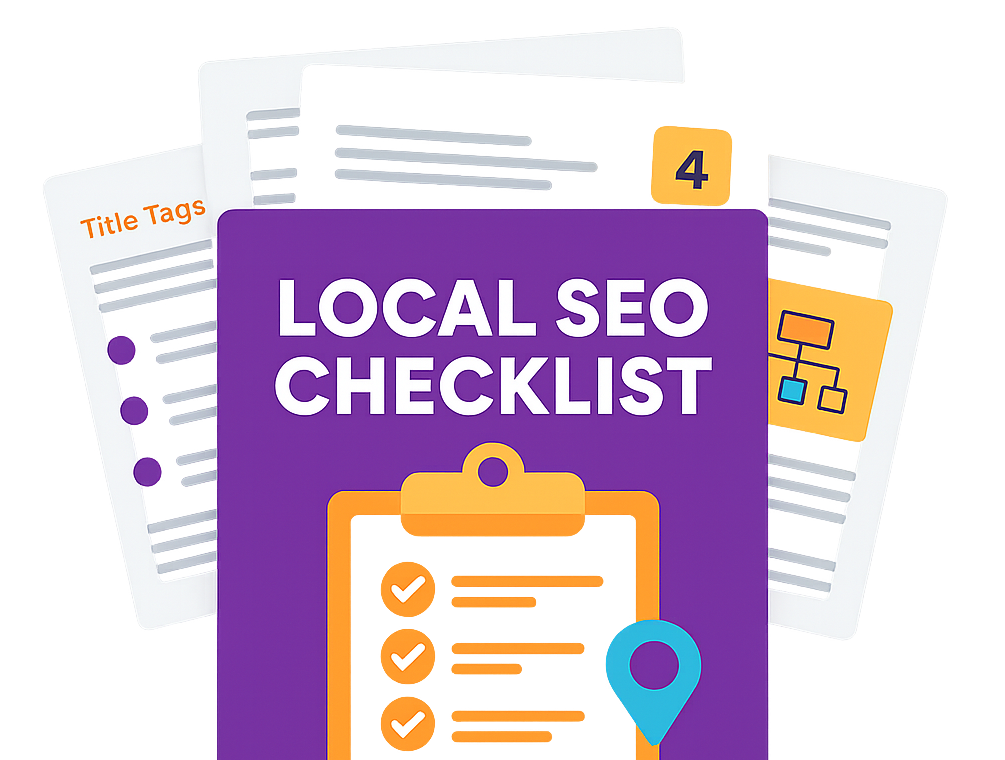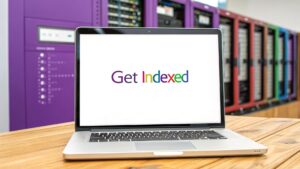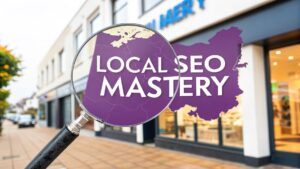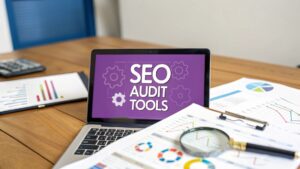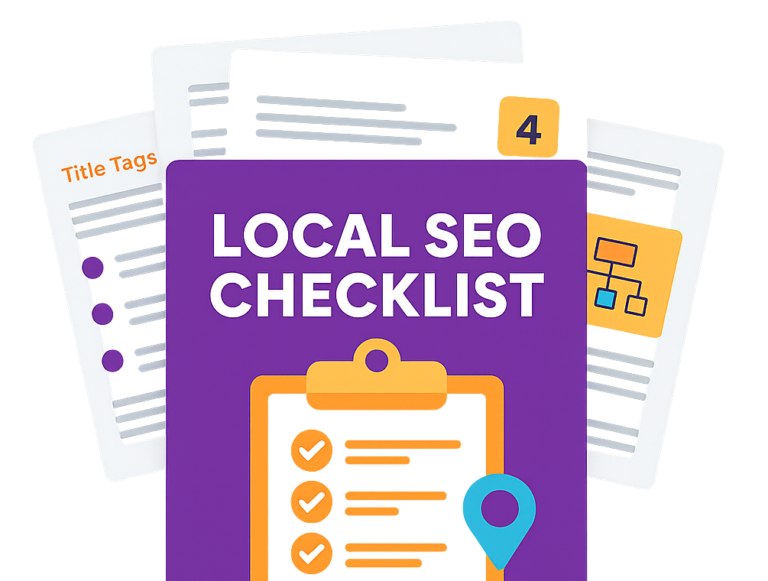Choosing the right digital marketing agency isn't about finding the best one—it's about finding the best one for you. The whole process boils down to matching your well-defined needs with an agency's proven skills and a communication style that just clicks.
Defining Your Goals Before Starting Your Search

Before you even think about Googling "digital marketing agencies," the most important work happens internally. I've seen too many businesses jump straight into agency interviews without a clear roadmap. It's like setting off on a road trip without a destination—you’ll definitely be moving, but you probably won't end up anywhere useful.
Vague wishes like "I want more traffic" or "we need a better online presence" are not goals. They're just wishes. They don't give you any real way to measure success, which makes it impossible to know if your investment is actually paying off. You need to translate those desires into specific, measurable outcomes that genuinely affect your bottom line.
Establish Your Key Performance Indicators
The first thing to do is nail down your Key Performance Indicators (KPIs). These are the hard numbers you’ll use to judge whether your marketing is working or not. When you shift from fuzzy ideas to tangible targets, your search for an agency transforms from a hopeful guess into a strategic mission.
Think about what success really looks like for your business. Is it:
- Lead Generation: Generating 50 qualified leads a month for your sales team to follow up on?
- E-commerce Sales: Increasing online sales revenue by 20% over the next three months?
- Brand Awareness: Becoming the go-to name for your service within a specific area, like Cambridgeshire?
Knowing these specifics means you can walk into a conversation with an agency and give them a precise brief. Trust me, the good ones love this. It tells them you’re serious and helps them know immediately if they’re the right fit.
Setting a Realistic Marketing Budget
Just as crucial is figuring out a realistic budget. Your investment level is a massive filter. It immediately narrows down your options and focuses your search on agencies that play in the same financial ballpark. What an agency can deliver for £2,000 a month is worlds apart from a £10,000-a-month strategy.
A clear budget saves everyone time—yours and the agencies'. More importantly, it grounds the conversation in reality from day one. It forces you to talk about value and return, ensuring you're looking for a partner who will grow with you, not just a supplier ticking boxes.
The UK's digital marketing scene is incredibly crowded. We're talking about 85 specialised digital advertising agencies and a market that grew at an annual rate of 5.8% between 2017 and 2022. With so many choices, having your goals and budget locked down is the single most effective filter you have. You can dig into more of these agency statistics from recent market analysis.
Evaluating an Agency's Real-World Expertise

Any agency can talk a good game. They’ll show up with a slick sales pitch and a glossy presentation, but what really matters is their real-world, proven expertise. That’s what’s going to move the needle for your business.
To pick the right partner, you need to dig deeper than the surface-level polish and look for hard evidence of their skills and past wins.
That means asking some pretty direct questions about their experience in your sector. Do they actually get the nuances between marketing a B2B tech firm versus an e-commerce fashion brand? Do they have a feel for what works for a local service business in Cambridgeshire? An agency that already speaks your industry's language has a massive head start.
Scrutinise Their Case Studies
Any agency worth its salt will have case studies ready to go. Your job is to pick them apart, not just give them a quick glance. Look for detailed metrics that tie directly back to the business goals you’ve already laid out.
It’s easy to get distracted by vanity stats like “we increased impressions by 200%.” Ignore the fluff. You need to focus on what actually impacts your bottom line:
- Growth in qualified leads: Did they bring in leads that turned into actual, paying customers?
- Increase in sales revenue: Can they draw a straight line from their campaign to a jump in sales, with real figures to back it up?
- Improved conversion rates: Did they make the client's website better at converting casual visitors into buyers?
If a case study is vague or conveniently missing hard data, that’s a big red flag. The best agencies are an open book with their numbers because they’re confident in the value they deliver. A key part of their competence is how they generate new business, so look for a solid grasp of B2B lead generation best practices and how they’ve applied them in the real world.
Assess the Team's Specialisations
A top-tier partner will have a team of dedicated specialists, not a handful of generalists stretched thin across every marketing discipline. The UK's advertising agency industry is a massive field, valued at £45.4 billion with over 19,400 businesses. In a market that crowded, specialisation is what separates the great from the mediocre.
A truly effective digital marketing partner doesn't just know marketing—they know your market inside and out. They understand your customers, your competition, and the specific challenges you face, and they have a proven track record to back it up.
When you’re talking to them, ask about the actual people who will be working on your account. Is there a dedicated SEO strategist? A PPC manager who lives and breathes Google Ads? A content specialist who understands your audience? This structure ensures every part of your strategy is handled by someone with deep, focused knowledge.
It’s also crucial to know who your competitors are and how an agency plans to outperform them. It’s worth learning how to conduct a competitor analysis yourself so you can have a more informed conversation. Ultimately, finding a team with a clear history of success in your niche is what you’re aiming for.
Agency Specialisation Checklist
To help you systematically evaluate an agency's suitability, use this checklist. It’s designed to help you look for the right signals and spot potential warning signs based on their specialisation and proven track record.
| Evaluation Criteria | What to Look For | Red Flags |
|---|---|---|
| Industry Experience | Case studies and client testimonials from businesses in your specific sector or a closely related one. They should speak your industry's language. | Vague examples, relying on successes in completely unrelated industries, or a lack of any relevant experience. |
| Service Specialisation | A dedicated expert for each core service you need (e.g., SEO, PPC, Content). Clear roles and responsibilities within their team structure. | One person managing multiple, distinct disciplines. Claims to be an "expert in everything." |
| Local Market Knowledge | For local businesses, evidence of successful campaigns in your geographical area. Familiarity with local competition and customer behaviour. | A generic, one-size-fits-all approach that ignores local market nuances. |
| Proven, Relevant Results | Hard data in case studies that align with your business goals (e.g., lead generation, sales revenue, ROI), not just vanity metrics. | Focus on metrics like "impressions" or "clicks" without connecting them to actual business outcomes. |
| Competitor Awareness | They can discuss your key competitors intelligently and have initial ideas on how to differentiate your business and gain market share. | Unfamiliarity with your competitive landscape or offering generic strategies that ignore competitors. |
By running through these points, you can build a much clearer picture of whether an agency has the specialised expertise to deliver the results you need, rather than just a compelling sales pitch.
Gauging Their Grasp of Modern Marketing Tech
In today's market, you can't get far without the right tech. A forward-thinking agency lives and breathes analytics platforms, SEO software, and automation systems. This isn’t about being dazzled by shiny, big-name software; it's about making sure they have a data-driven culture and the skills to turn raw numbers into actual business growth.
Your mission here is to figure out how an agency uses its tech stack to make smarter decisions. Are they just reporting on vanity metrics, or are they using technology to find a genuine competitive edge? The difference is huge.
Beyond the Basics: What Is Their AI Strategy?
Artificial Intelligence (AI) isn't some far-off concept anymore. The best agencies are already using it as a practical tool to get better results, and they should be able to tell you exactly how. Vague answers just won't fly.
An agency that uses AI strategically can unlock efficiencies and insights that its competitors simply can’t. So, ask them directly about their approach:
- Campaign Optimisation: How do you use AI to tweak ad bidding in real-time or predict which creative will resonate most with our audience?
- Audience Segmentation: Can you show me an example of how you’ve used AI to uncover and target a niche customer segment we might have missed?
- Predictive Analytics: Are you using predictive models to forecast market trends or spot customers who might be about to churn?
An agency’s real value isn’t in the software they own, but in how they use it. Their ability to translate data into actionable strategy is what separates a good technical partner from one who just has expensive subscriptions.
This shift towards tech is clear across the UK. In 2024, digital marketing spend hit £35.54 billion and is expected to blow past £40 billion in 2025. What’s driving that? Technology. A whopping 94% of UK digital marketers are already using AI in their advertising campaigns, as noted in trends from SearchHog.co.uk. An agency’s comfort with these tools isn't a bonus—it's essential.
Assessing Their SEO and Analytics Toolkit
An agency’s toolkit says a lot about its priorities and level of expertise. You don’t need to be a guru on every platform, but you should know what to look for. Ask them what they use for the bread-and-butter tasks: keyword research, technical site audits, backlink analysis, and performance reporting.
There are loads of great tools out there, and you can get a feel for the landscape with our SEO software comparison. Honestly, the specific name on the tin matters less than their reason for choosing it. A great agency won't just list their subscriptions; they’ll explain why they picked a particular platform and how its features directly help them nail their clients' goals. That's the sign of a strategic approach, not just someone following the latest trend.
Finding the Right Communication and Cultural Fit

An agency can have all the technical skills in the world, but if your communication styles clash, the partnership is doomed from the start. This is the one thing businesses often overlook when picking an agency, yet it's usually the secret sauce to a successful, long-term relationship.
Think of it this way: a great agency should feel like an extension of your own team. That only happens when the relationship is built on a foundation of transparency and mutual respect. You need to scrutinise their approach to client relationships just as much as you do their technical skills.
Defining the Communication Cadence
Before you even think about signing a contract, get absolute clarity on how communication will work. Don't leave this to chance. Mismatched expectations here are a fast track to frustration on both sides.
I've seen it happen time and again. So, make sure you ask a few key questions:
- Who is my main point of contact? You need a dedicated account manager who gets your business, not someone who passes you from pillar to post.
- How often will we get updates? Is it weekly check-in calls? Monthly strategy sessions? Figure out a rhythm that works for you.
- What’s the process for urgent issues? Knowing there’s a clear channel for emergencies brings massive peace of mind.
Getting this sorted upfront ensures everyone is on the same page. If you're unsure what good looks like, check out established frameworks like these Google Ads client communication best practices to see what a professional setup involves.
Beyond Reports to Real Insights
Reporting is obviously a huge part of the agency-client relationship, but the quality of those reports can vary wildly. A glossy PDF filled with jargon and vanity metrics is totally useless. What you actually need are actionable insights that tie directly back to your business goals.
Ask to see a sample report. Does it clearly connect to the goals you've discussed, or is it just a data dump of impressions and clicks?
And honestly, modern agencies should offer more than static documents. Ask if they provide access to live, real-time dashboards where you can check in on performance whenever you want.
The best reports don't just tell you what happened. They explain why it happened and, crucially, what the agency plans to do next. This shows they’re being proactive and strategic, not just reactive.
Ultimately, this all comes down to trust. You need to feel confident that your agency isn't just another supplier, but a genuine partner who is invested in your growth, communicates openly, and actually values your input.
Decoding Contracts and Pricing Models
Right, let's talk brass tacks. The moment the proposal and contract land in your inbox is when things get real. You’re moving from exciting strategies and big promises to the pounds and pence that will actually leave your bank account.
Getting this part right is absolutely critical. It’s not just about finding the cheapest option; it’s about making sure you’re getting genuine value for your money.
For most UK small businesses, agencies tend to use a few standard pricing models. Each has its place, and the best one for you really boils down to what you need and what your goals are.
Understanding Common Pricing Structures
First off, you need a clear picture of how an agency actually charges for its time. This helps you compare different proposals fairly and ensures the money side of things lines up with what you’re trying to achieve.
You’ll almost always come across one of these three models:
- Monthly Retainer: This is the most common setup for ongoing work like SEO or social media. You pay a fixed fee each month for a specific set of services. It’s great for budgeting and perfect for long-term growth. In the UK, a typical retainer might start from £2,000 and go up from there, depending on the scope.
- Project-Based Fee: This is a one-off charge for a task with a clear start and finish, like building a new website or launching a specific ad campaign. It’s ideal for standalone jobs where you know exactly what the final deliverable is.
- Performance-Based: Here, the agency’s fee is directly linked to the results they generate—think a percentage of sales or a fixed amount per qualified lead. It’s a great way to align their incentives with yours, though it’s less common for things like SEO, where results build up over time rather than happening overnight.
Scrutinising the Fine Print
Once a proposal looks good, it's time to put on your reading glasses and get forensic with the contract. This document is your safety net, so never just skim it. Pay very close attention to a few key sections to avoid any nasty surprises down the line.
First, the Scope of Work. This needs to be incredibly detailed. It should spell out precisely what the agency will do and, just as importantly, what they won't do. Vague phrases like "social media optimisation" are a massive red flag. A good contract will specify the number of posts, the platforms they'll manage, and how often they'll report back to you.
Next, have a close look at the Contract Length and Termination Clause. Lots of agencies will push for a 12-month commitment, but for a small business, a flexible monthly rolling contract is so much better. It dramatically reduces your risk. Make sure you understand the notice period, which is usually around 30 days.
A transparent contract is the bedrock of a good partnership. It should protect both of you and leave zero room for misunderstandings. If an agency gets cagey about clarifying terms or seems reluctant to put things in writing, take it as a serious warning sign.
Finally, confirm who owns what if you decide to part ways. You must always retain full ownership of your assets, like your Google Ads account and your website. It's your business, after all.
Securing real value is everything, which is why it's worth looking into affordable SEO services for small business that can help you find a partner who balances quality with a price that makes sense for you.
Your Final Agency Selection Checklist
Right, let's bring this all together. Think of this as your final sanity check before you commit. You've done the hard work of narrowing down your options, and now it’s time for those last crucial conversations.
Use these pointers to guide your final meetings and make sure you're picking a genuine partner, not just another supplier. This decision tree can help you visualise which pricing model feels right for your goals.
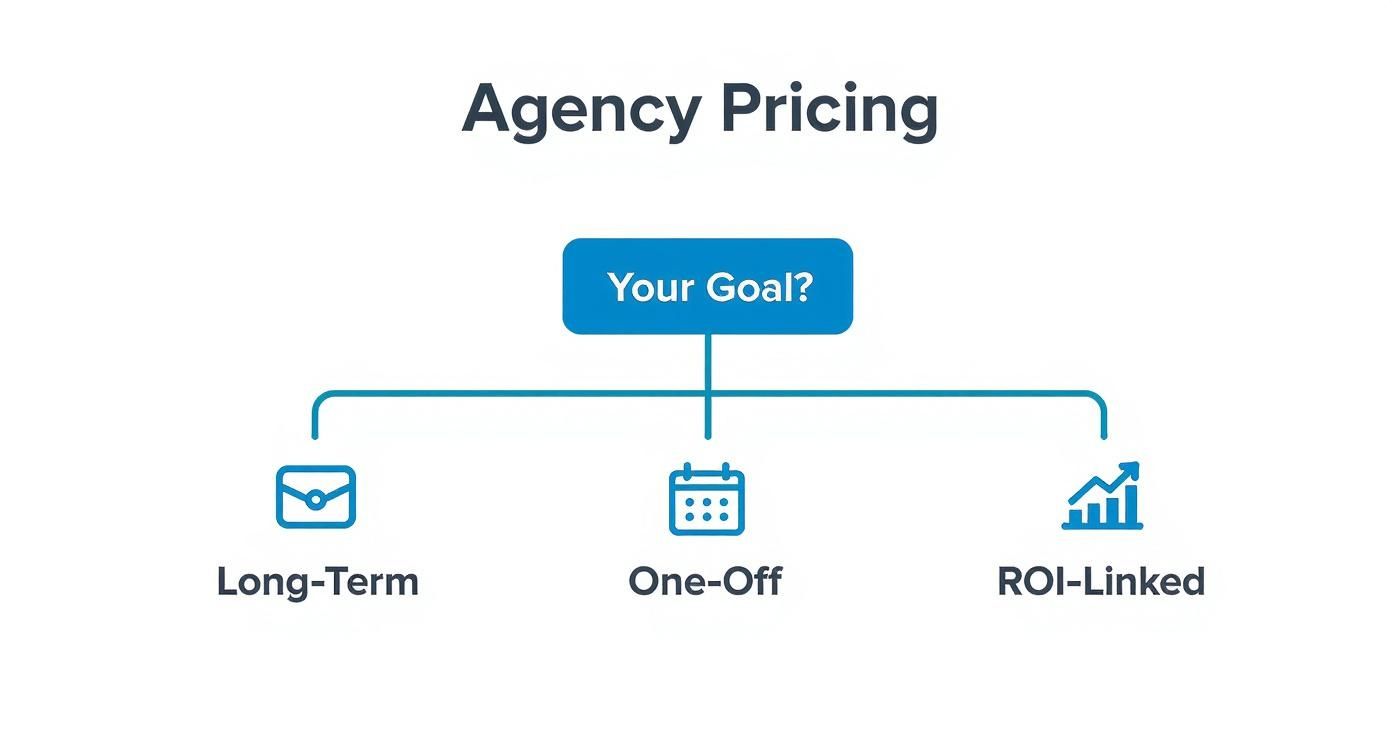
As you can see, retainers are built for steady, long-term growth. Project fees are perfect for those one-off jobs, while performance-based models directly tie your spend to your return on investment.
Key Questions for Your Shortlist
Before you sign on the dotted line, run through these final questions with each of your top contenders. Their answers will tell you a lot.
- Goal Alignment: Are they truly on the same page with your primary KPIs? Make sure they understand what success actually looks like for your business.
- Budget Confirmation: Does the proposed budget feel realistic for what you want to achieve? Every cost should be clearly itemised with no vague "admin fees" hiding in the small print.
- Team and Culture Fit: Have you met the actual people who will be working on your account day-to-day? It's crucial that their communication style clicks with yours.
- Reporting Clarity: Do their reports give you information you can actually use? A good report provides insights, not just a data dump. Check out our monthly SEO report template to see what you should be looking for.
- Contract Scrutiny: Read the contract carefully. Are the terms fair and transparent, especially the scope of work and the termination clause? You need to know you have a clear exit strategy if things don't work out.
Going through this final review process empowers you to make a choice you can stand behind. You’ll bring on board a partner who is genuinely invested in your growth and ready to deliver results. It's the last step in building a solid foundation for a successful partnership.
A Few Common Questions Answered
When you're trying to figure out how to choose the right digital marketing agency, a few questions always seem to pop up. Here are the straight-up answers to the ones we hear most often from UK businesses.
What’s a Realistic Budget for a Small Business?
For a small to medium-sized business (SME) here in the UK, a proper digital marketing retainer usually starts somewhere in the £2,000 – £5,000 per month range. That's before you factor in what you'll spend directly on ads.
Of course, this number can swing quite a bit. It all depends on what you need—SEO, PPC, content marketing—and how fierce the competition is in your industry. The best approach is to be upfront about your goals and budget from the get-go. That way, you can find an agency that can actually work with what you've got.
Should I Go for a Specialist or a Full-Service Agency?
Honestly, this comes down to what you need to achieve right now. If your one big goal is to crush it on a single channel, like nailing organic search or dominating paid social media, then a specialised ‘boutique’ agency can bring some seriously deep expertise to the table.
But if you’re looking for a bigger, more cohesive strategy that pulls everything together—SEO, content, social, and email—a full-service agency is usually the better bet. It gives you a unified plan and just one person to talk to. For most SMEs aiming for steady, long-term growth, a full-service setup just makes more strategic sense.
One of the biggest red flags you can see? Any agency that guarantees a number one ranking on Google. Real SEO is a long game of continuous work and earning trust, not making promises they can't keep. Also, steer clear of anyone pushing a 'one-size-fits-all' package that completely ignores what makes your business unique.
What Are the Biggest Red Flags When Vetting an Agency?
Besides the impossible guarantees, watch out for agencies that are cagey about their process or how they report results. If they can’t show you detailed case studies with real, measurable outcomes, that’s a major warning sign.
High-pressure sales tactics are another one. A true partner wants to understand your business and build a relationship, not shove you into signing a contract. You have to trust your gut—if something feels off, it probably is.
At Bare Digital, we're all about total transparency and getting you real results. Our flexible monthly contracts and custom activity plans are built specifically for UK SMEs like yours. Get your free, no-obligation SEO Health Check today and see what a specialist agency can really do for your growth.


